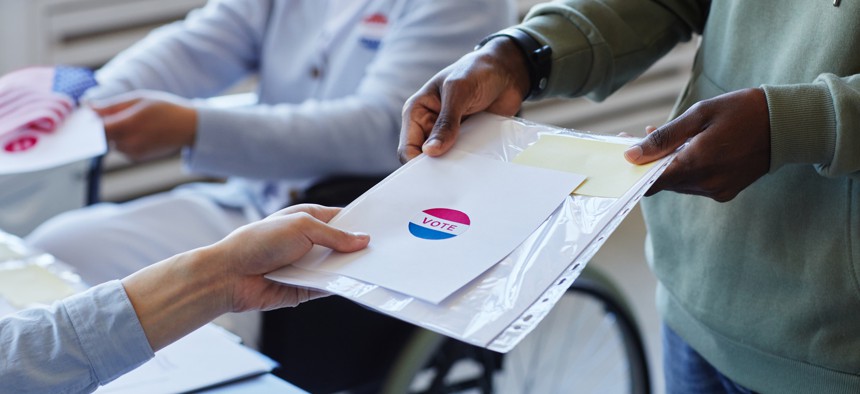Cybersecurity front and center in voting innovation

SeventyFour/Getty Images
Ensuring votes have a paper trail is a far better solution than relying on emerging, unproven technologies, election security experts say.
As Americans cast absentee or in-person ballots in this year’s midterm elections, the biggest concern for state and local government officials remains the cybersecurity of their elections.
Those concerns came into sharp focus recently, as more than 100 election jurisdictions reported that they were still waiting for help from the Cybersecurity and Infrastructure Security Agency to ensure their voting systems were protected.
“The most secure ballot is one that is a paper ballot, passed by hand or marked with a ballot marking device,” said Amanda Zoch, project manager for elections and redistricting at the National Conference of State Legislatures. “That eliminates opportunities” for charges that hackers changed votes or anomalies affected results, she said.
Still, voting technology advocates say voting can be made more accessible and secure.
West Virginia announced in 2018 that it would pilot the use of blockchain-based mobile voting for eligible service members and overseas citizens, in a bid to encourage greater participation.
But the effort ran into difficulties after a report from MIT researchers found that the voting method was vulnerable to attacks that could allow users’ votes to be altered or stopped, and in 2020 West Virginia severed ties with Voatz, its vendor on the project.
“With any sort of online electronic internet voting, the cybersecurity people are always concerned the most,” Zoch said.
But the use of blockchain in voting still has proponents. In a speech at the National Association of State Chief Information Officers’ annual summit in October, technology and innovation strategist Jack Shaw said blockchain voting helps create a balance between making sure voting is accessible, while also ensuring only those eligible to vote can do so.
“The easier we make [voting], the less secure it's claimed to be,” Shaw said. “The more secure we make it, the harder it's claimed to make it to vote. With blockchain-enabled voting, properly implemented, we can gain both at the same time.”
And digital voting advocates point to the efforts of countries like Estonia or Indonesia, which enable digital voting — in addition to easily accessible government services.
Brian Platz, CEO of blockchain-based data management company Fluree, said digital voting “ultimately can not only be more efficient, but it can be more trustworthy,” especially if everyone has a digital identity that is secure from hacks or tampering.
Platz said the efforts of universities to provide digital transcripts for students could also be instructive for online voting, because both require credentialed, decentralized digital identification. He said colleges nationwide are slowly “coalescing around a vocabulary” of how to standardize and secure digital transcripts for online viewing – insights that could also be applied to digital voting.
One area where technology could be useful is to help speed up vote counts, which in some states can take days. In an October event hosted by Axios, former Rep. Will Hurd said improving the speed and efficacy of vote counting could reduce questions about the validity of results. “It shouldn’t take two weeks to tabulate counts,” Hurd said.
Others agree that the hand-counting of paper votes needs to be sped up. During a September event hosted by the U.S. Election Assistance Commission, Dan Wallach, a professor in Rice University’s Department of Computer Science, said counting paper ballots by hand is “slow and surprisingly inaccurate.”
Zoch said there is “widespread adoption and interest on both sides of the aisle” in voting systems having a paper backup so every vote cast has a paper trail and can be effectively audited by local officials.
And while technology can help validate ballots could play an expanded role in doing so, Wallach said that to suggest the U.S. should be entirely reliant on technology like blockchain for its voting systems would take a series of “massive intellectual leaps.”






